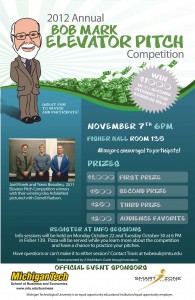
The teams will also meet regularly with their on-campus mentors and venture capitalists and have access to a micro-grant program offering up to $2,500 for each team to move their business forward.
The Tech teams are GreenedIt!, a web-based application for energy auditing, and Aquaponics, for healthy, local food in urban communities.
GreenedIt! team members are physics students Travis Beaulieu, an undergraduate, and graduate student Abhilash Kantamneni. The team traveled to East Lansing for their initial training this past weekend.
“The training we received through the challenge was incredibly useful,” said Beaulieu. “The whole point was to try and get young entrepreneurs into the mindset of finding a customer need and forming the idea around the customer’s feedback. Thankfully this training worked for our team, and we had a complete pivot during the weekend.”
The other team, Aquaponics, features indoor farming using water instead of soil, with a fish tank providing nutrients to plants. Team members include Robert Handler, post-doctoral environmental engineer in the Sustainable Futures Institute; Josh Krugh, economics undergraduate; and Jacob Bray, chemical engineering undergraduate.
“Aquaponics is a combination of aquaculture and hydroponics,” Handler said. “And we want to examine the potential for this type of agriculture to expand as a business opportunity in urban communities throughout the state.”
On the final day of the venture challenge, all participating teams will present their results, and a few teams will be awarded additional prizes and investments totaling $50,000 or more. The six-month challenge is run by the University of Michigan Center for Entrepreneurship.
Written by Senior Editor Dennis Walikainen of University Marketing and Communications.

 If you have a business idea that you want to protect but don’t understand all the issues, next Tuesday’s Savvy Entrepreneur session is for you. The series features best practices sharing via 2-Way Interactive Web Conferencing. At this event you’ll learn key Strategic Intellectual Property Management Practices, including how to navigate through the dreaded Non-Disclosure Agreement with customers and partners. Learn why and how to protect one of your business’s most valuable assets affordably from local leading entrepreneurs and specialists. Bring your questions to this program to advance your technology entrepreneurship skill set.
If you have a business idea that you want to protect but don’t understand all the issues, next Tuesday’s Savvy Entrepreneur session is for you. The series features best practices sharing via 2-Way Interactive Web Conferencing. At this event you’ll learn key Strategic Intellectual Property Management Practices, including how to navigate through the dreaded Non-Disclosure Agreement with customers and partners. Learn why and how to protect one of your business’s most valuable assets affordably from local leading entrepreneurs and specialists. Bring your questions to this program to advance your technology entrepreneurship skill set.